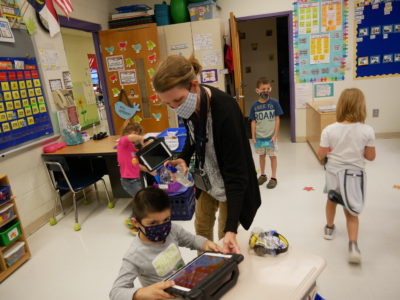

Update 3:03 p.m., Feb. 24, 2021: The bill passed the full House unanimously. One amendment was added that includes the state’s residential schools in the program. It goes now to the Senate.
A bill that would require districts around the state to offer a summer learning program for at-risk students made its way through three committees in the General Assembly on Feb. 23 and is expected to be heard on the House floor on Feb 24.
“Together, we can close the COVID gap and do great things for students in North Carolina,” said Kim Morrison, superintendent of Mount Airy City Schools, when speaking in support of the bill during an early-afternoon House education committee.
Under the legislation, each district in the state must offer a summer program that lasts at least 150 hours or 30 days to K-12 students to battle learning loss from the COVID-19 pandemic. The priority is for students who are considered at-risk, but other students can participate if space is available. The program is voluntary for families and only applies to traditional public schools.
The legislation was unveiled last week, but lawmakers held off on giving it a full hearing in committee until this week so they could collect feedback from the public.
Hear House Speaker Tim Moore, R-Cleveland, speak about the bill in the tweet below. He is one of the primary sponsors of the legislation.
There were already some changes made to the legislation before it hit the House Education committee (its first stop) early yesterday afternoon. Here is the original version of the bill.
Originally, the summer camp had to last six weeks, but that language was changed to “at least 150 hours or 30 days” to allow districts, particularly those with year-round calendars, more flexibility.
The new version of the bill also makes these summer programs exempt from General Assembly mandated class-size limits, explicitly allows the use of Read to Achieve reading camp funds from the 2020-21 fiscal year to help pay for the program, and allows districts to admit students to the program who aren’t enrolled in their district.
This last provision would make it possible for students in charter, private, or home schools to participate if slots are open.
Originally, these students would have had to pay a fee, but an amendment (see below) eliminated this element.
A series of amendments were added to the bill during the House education committee, including:
- An amendment that would require districts to report to the legislature on how well students did in the summer program.
- An amendment eliminating districts’ ability to levy a fee for students participating in the program who are not from the district.
- An amendment that would require some kind of in-person social-emotional learning support for students in the program.
- An amendment that specifies the intention of the General Assembly to direct a portion of federal COVID-19 aid to be used for the summer program. This is part of the $1.6 billion the federal government sent North Carolina public schools in the most recent round of COVID-19 relief.
After the amendments were added, two district superintendents spoke in support of the bill.
Aaron Fleming, superintendent of Harnett County Schools and a former advisor to Moore, said “this is not a magical solution to repair the gaps, only a helpful tool.”
He said he had concerns about finding teachers to teach in the program over the summer, but he said a prior change in the current bill that allows retired teachers to participate with as little as one month of separation from their district will be helpful. Normally, retired teachers must have been separated for six months before being eligible to come back and teach in a district.
Morrison said her district’s “goal is to work with the state legislature to provide a strong network of support for every single student in the state.”
She said she appreciated the flexibility given in changing the requirement of the program from six weeks to 150 hours, and also the change regarding retired teachers.
Later this afternoon, the bill also received a favorable vote in a House pension committee and the House rules committee.



